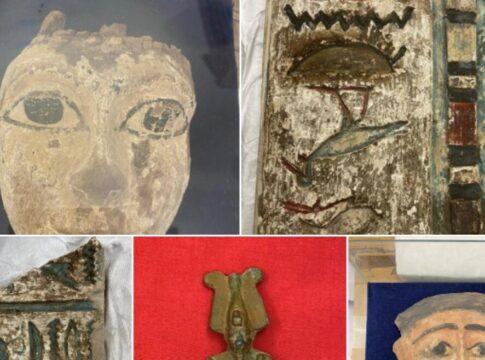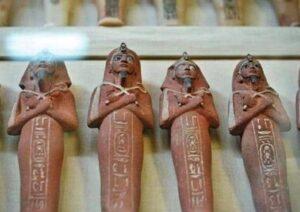In a significant victory for cultural preservation, Egypt has successfully repatriated 67 ancient artifacts from Germany, spanning various eras of its rich history. This achievement was announced by the Egyptian Foreign Ministry, highlighting ongoing efforts to reclaim national treasures unlawfully taken abroad.
In a ceremony at the Foreign Ministry’s headquarters in the New Administrative Capital, Ambassador Yasser Shaaban, Assistant Foreign Minister for Cultural Relations, officially handed over the artifacts to a specialized committee from the Ministry of Tourism and Antiquities. These valuable pieces were retrieved through the diligent work of the Egyptian embassy in Berlin.
Among the recovered artifacts are remarkable items from Egypt’s historical tapestry, including a mummified foot and leg, two intricate masks, and a pair of wall reliefs from the tomb of Minister Pek An Ren Ef of the 26th Dynasty in Saqqara. Additionally, the collection features a royal bronze statue, underscoring the diversity and significance of the returned treasures.
The cache also includes a fascinating assortment of small ushabti statues, traditionally placed in tombs to serve the deceased in the afterlife, according to ancient Egyptian customs. Complementing these are bronze statues of Osiris, the revered god of the dead and afterlife, reflecting Egypt’s deep spiritual heritage.
The Foreign Ministry emphasized that this recovery is part of a broader initiative to protect and reclaim Egyptian cultural heritage. In collaboration with the Ministry of Tourism and Antiquities, as well as diplomatic missions worldwide, Egypt is intensifying its efforts to track and return artifacts illegally smuggled out of the country.
This successful repatriation from Germany marks another chapter in Egypt’s ongoing quest to recover antiquities. Globally, countries are increasingly working together to address the illegal trade of cultural artifacts, a market that has grown significantly due to high demand and the historical allure of ancient objects.
Egypt’s proactive stance in reclaiming its heritage is part of a larger international movement. Countries such as Greece, Italy, and Mexico have also been active in similar efforts, seeking to bring home artifacts that not only hold cultural and historical significance but are also symbols of national identity.
Experts in cultural heritage highlight the importance of such initiatives, noting that they contribute to the preservation of history and the prevention of illicit trade in antiquities. The return of these artifacts not only enhances Egypt’s historical collections but also strengthens diplomatic relations with countries willing to cooperate in these efforts.
As Egypt continues to safeguard its treasures, the collaboration between international museums, collectors, and governments remains crucial. These partnerships are essential in ensuring that cultural artifacts are appreciated within their rightful context and preserved for future generations.
With the latest recovery from Germany, Egypt reaffirms its commitment to protecting its heritage. Future efforts will likely focus on enhancing international collaborations and leveraging technology to prevent the illegal export of artifacts. The nation’s dedication to cultural preservation stands as a testament to the enduring value of history and identity in an increasingly interconnected world.



